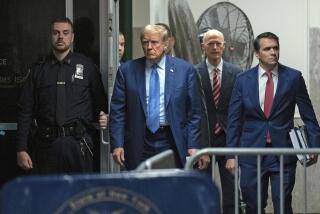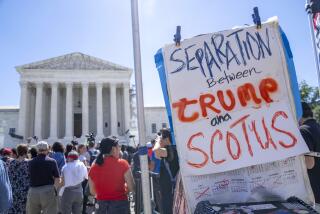Immunity May End for Envoy in Fatal Crash
- Share via
WASHINGTON — Bowing to a crescendo of American indignation, Republic of Georgia President Eduard A. Shevardnadze said Friday that he is prepared to take the extremely rare step of lifting the diplomatic immunity of a Georgian Embassy official facing possible second-degree murder charges here.
The Clinton administration praised Shevardnadze for his “courageous . . . and responsible” action. It defused a week-old controversy over the death of a 16-year-old Maryland girl, even though it troubled many diplomats who fear any erosion of the principle of diplomatic immunity that has long protected foreign officials around the world.
The case began the night of Jan. 3 as a car driven by Gueorgui Makharadze, the second-ranking diplomat in the Georgian Embassy, slammed into a smaller vehicle at a stoplight at a busy Washington intersection. The second auto was knocked into the air and crashed onto a third car in which the girl was a passenger.
Makharadze invoked his privilege at the scene to avoid taking a Breathalyzer test. Arresting officers suspected that he was drunk. They said that he was traveling an estimated 80 mph as he entered the intersection.
The accident set off a storm of complaints. On Capitol Hill, lawmakers talked about ending foreign aid to Georgia unless Makharadze was prosecuted. And the case struck a chord on talk radio programs, with outraged callers demanding to know why foreign criminals were allowed to get off.
Although the U.S. government had asked Shevardnadze to waive immunity, few officials thought he would do so. Less than 24 hours earlier, the Georgian Foreign Ministry had said that the diplomat would be sent home, the usual procedure in such cases.
But Shevardnadze, in a statement issued in the Georgian capital of Tbilisi, said that he is ready to waive Makharadze’s immunity and would order him to remain in the United States and cooperate with authorities.
It was not clear why Shevardnadze choose to overrule his Foreign Ministry, but U.S. officials speculated that he was unwilling to tarnish his reputation in the United States. As foreign minister of the Soviet Union before it collapsed, Shevardnadze developed a close relationship with former Secretary of State James A. Baker III and established himself as a firm advocate of democracy.
The U.S. attorney’s office in Washington said that it may charge Makharadze with second-degree murder, manslaughter or negligent homicide. But the officials said that they cannot file charges until diplomatic immunity is waived.
But Shevardnadze said he would not sign the formal waiver until charges are filed. U.S. officials said they did not believe, however, that the Georgian president would try to use this chicken-or-egg dilemma to protect the diplomat. If he had not wanted to allow the man to be prosecuted, he had an unquestioned right to call him home.
For the State Department, the case produced decidedly mixed emotions. Although the department formally requested Georgia to allow the prosecution, officials were clearly uneasy with the precedent.
There are a few exceptions, but nations almost never allow their diplomats to be prosecuted in foreign courts on serious criminal charges. The doctrine of diplomatic immunity, which traces its roots to the ancient Greeks and Romans, shields diplomats in every country on the globe.
As a general rule, the United States never waives immunity for its diplomats overseas. “We do believe in diplomatic immunity,” Burns said. “It’s been the law of the United States since 1790. It has worked well for us . . . because it provides protection for our diplomats, especially in countries that do not have an established tradition of the rule of law.”
Paul Rothstein, a Georgetown University law professor, said that “the wall of diplomatic immunity is thoroughly firm and strong across the world.” While Americans may wish to bring offending foreign officials to our bar of justice, “it’s in our interest not to introduce breaches in that wall,” Rothstein said.
Abraham Sofaer, a former legal advisor to the State Department, added that “it’s very risky” for the United States to advocate changes in the practice.
“Immunity gives our diplomats a defense against arbitrary and politically motivated charges,” said Sofaer, now a fellow at Stanford University’s Hoover Institution.
To some critics, however, that protection is overly broad. It’s one thing to exempt foreign diplomats from traffic violations or parking tickets, or from public misconduct as in a recent New York incident where two allegedly drunken Russian United Nations diplomats fought with police seeking to ticket their car. But murder or manslaughter?
Sofaer noted that, when the roles have been reversed--when U.S. diplomats have been in trouble in other countries--American officials “have been insufficiently willing to waive immunity for our people.”
A case in point occurred in Moscow in 1993, when the State Department refused to drop diplomatic immunity for a U.S. envoy who struck and killed a Russian pedestrian on a dark street.
Soviet police accused the diplomat of driving under the influence of alcohol. U.S. authorities, however, disputed that and recalled him from Moscow 36 hours after the accident. No disciplinary action was taken against him and he remains in the U.S. Foreign Service.
The State Department says that of the 18,350 foreigners with diplomatic immunity in the United States, 17 were involved in serious offenses in 1995. They included nine assaults, four burglaries and four violations in other categories. An additional 28 people were suspected of drunk or reckless driving.
More to Read
Sign up for Essential California
The most important California stories and recommendations in your inbox every morning.
You may occasionally receive promotional content from the Los Angeles Times.










